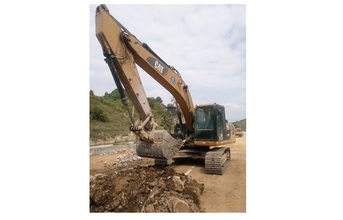
If not properly disposed of, the grease remains on the ground and can cause environmental harm. It can contaminate the soil and potentially impact nearby water sources.
Instead, using a higher quality lithium complex or calcium sulfonate grease will enable operators to re-apply the grease much less frequently. For example, Caterpillar recommends that when using one of its Cat branded greases, operators re-grease every 50 service hours, or weekly, for standard applications. This interval would significant reduce waste over the equipment life when compared to a simple lithium based grease, thus immediately enhancing the sustainability of your operation. Caterpillar only recommends re-greasing the equipment daily for severe applications.
Note that it is important for operators to consult with their original equipment manufacturer (OEM) before changing their maintenance intervals.
Enhancing sustainability without increasing costs
Most importantly, a simple switch in grease can deliver sustainability benefits without increasing overall operational costs. That's because using a lower quality, simple lithium grease doesn't deliver the same equipment protection as a premium grease, no matter how often it's re-applied. Re-applying a lower-quality grease more frequently doesn't compensate for its inability to protect machine parts from the hot, dusty or wet operating environments common to construction sites everywhere.
In short, using a higher quality grease can enhance equipment performance and productivity, resulting in less unscheduled downtime and greater equipment availability. Over the cost of the equipment life, this will end up saving operators significant labor and capital costs.
In fact, overgreasing can cause problems. The adage "a little is good and more is better" does not apply to grease. Overgreasing a joint can cause the grease to act like a "dirt magnet." Dirt adheres to visible grease. Once in the grease, the particulate can gravitate into the joint and act as an abrasive wearing out pins and bushings prematurely. Also, greasing too frequently can cause the joint seals to break open allowing excess grease to leak out of the joint and onto the equipment (and the ground).
In short, using the right grease can enhance equipment performance and productivity, resulting in less unscheduled downtime and greater equipment availability. Over the life of the equipment, this will end up saving operators significant labor and capital costs.
(Continued on the next page)



























